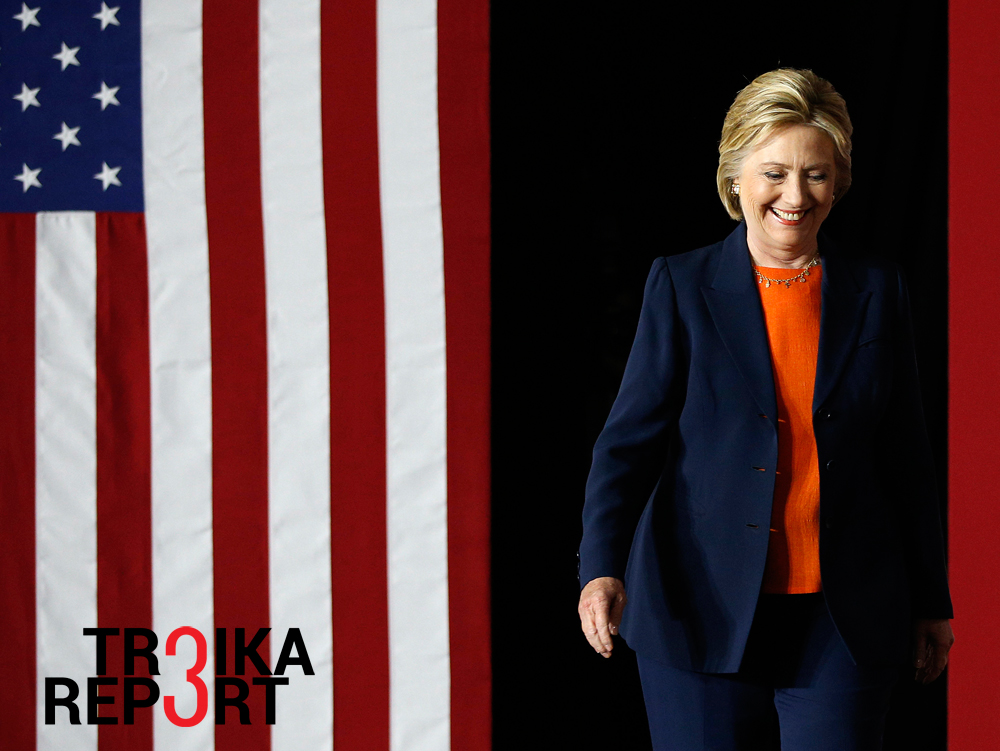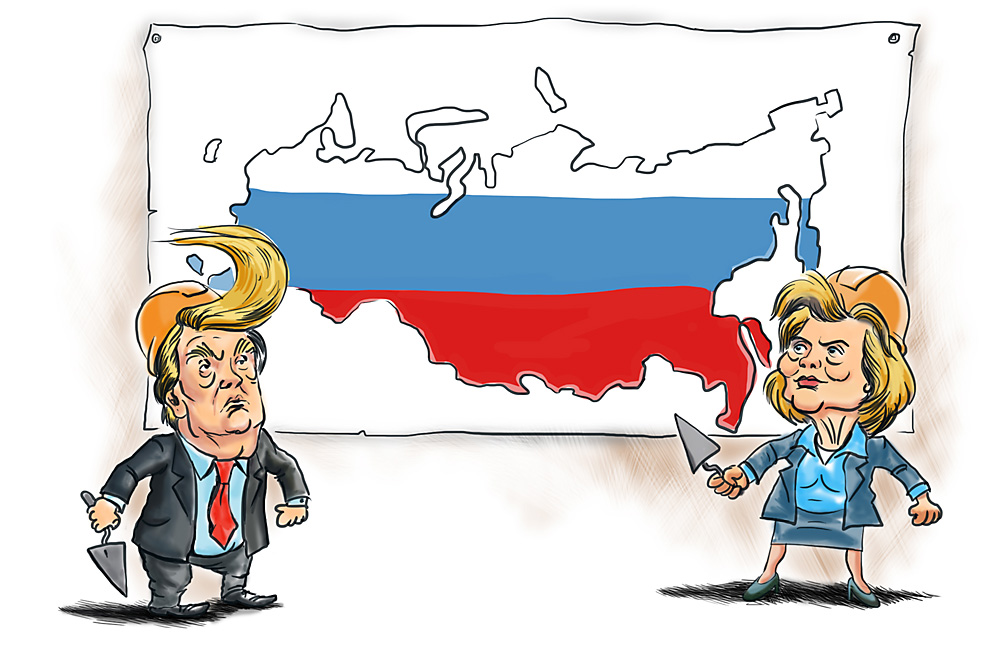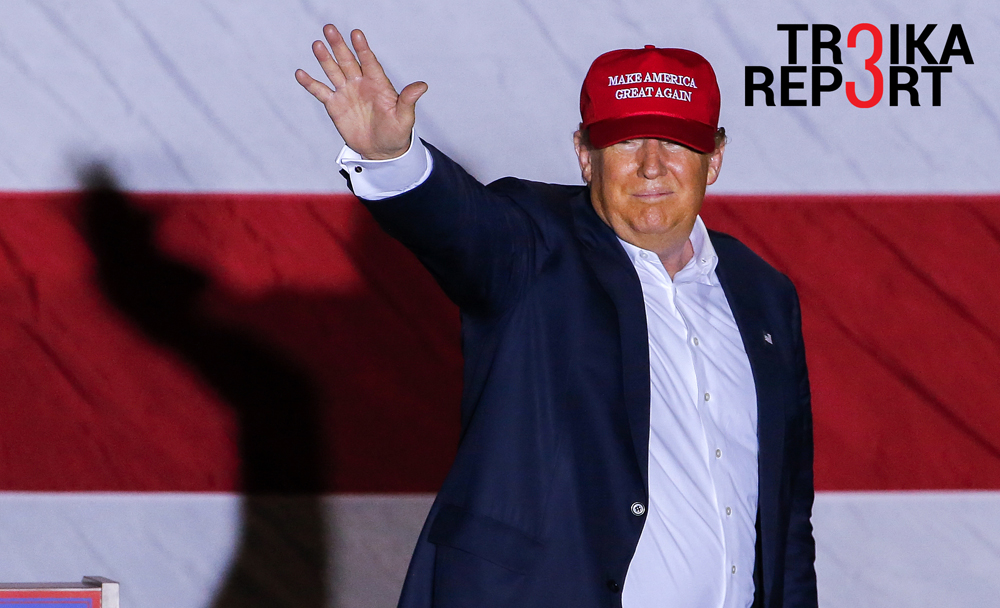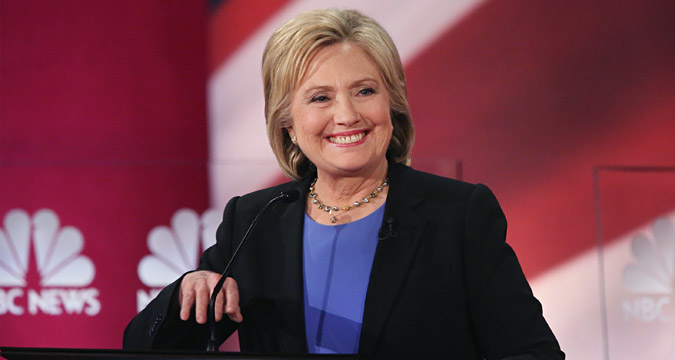Does Moscow really care who prevails in US elections?

Democratic presidential candidate Hillary Clinton takes the stage before giving an address on national security, June 2, 2016, in San Diego, California.
APSpeaking to supporters in San Diego on June 2, Hillary Clinton, now Democratic Party nominee for president, “defined her hawkish foreign policy” said Breitbart News Network (a syndicated news and opinion website), in an apparent attempt to sharpen differences with Republican presidential candidate Donald Trump for her electoral college.
In contrast to her Republican opponent who pledged not to “seek war or aggression” (“America First” speech at Washington’s Mayflower Hotel), Clinton did not exclude violent actions to disarm Iran, and pleased the military by supporting the presence of US armed forces overseas to avoid what she termed a “vacuum” that would leave other countries free to dictate their will in global affairs.
Accepting any result with equanimity
Meanwhile, the assumption that Moscow favours a Trump victory, based on the words of President Vladimir Putin about the GOP iconoclast (“[Donald Trump is] a really brilliant and talented person, without any doubt”), looks a little over-stretched.
Asked to comment on Clinton’s statement that should Trump win the U.S. election “They’ll be celebrating in the Kremlin,” Russian presidential spokesperson Dmitry Peskov looked surprised.
“What would be the reason for the ‘celebrations’?” he asked.
Peskov went on to explain that Moscow would consider “the best” U.S. president the one that nets the majority of the votes of the American people despite the “peculiarities of the U.S. electoral system.
Contrary to early talk that Trump was Moscow’s preferred candidate, it appears that Kremlin and Russian political elites have not actually taken sides in the U.S. presidential polls. They seem ready to accommodate any new face in the White House for the simple reason that no one in Moscow has illusions of bettering relations with the U.S. in the foreseeable future. And yet…
She-warrior or she-diplomat?
If Clinton is elected president, should Moscow forget about any “reset” in the relationship and brace itself for a full-fledged Cold War that could even turn into a hot war? Mikhail Khazin, a well-known Russian economist with strong anti-Western political views, spelt out this view in a recent radio programme..
Fyodor Voitolovsky, deputy director at the Moscow-based Institute of World Economy and International Relations at the Russian Academy of Sciences, dismissed such doomsday forecasts as laughable when speaking with RIR.
“A war? With launch of nuclear missiles? Come on, let’s be serious! There is the rhetoric of the election trail. And there are realities on the ground. It is an enormous difference. The context of relations between Russia and the United States dictates a search for compromises, no matter what.”
Do you believe that a President Clinton would be ready for compromises?
“First of all, it is more important that we are ready. Moscow has vast experience in dealing with all kinds of American presidents. We have dealt with (Ronald) Reagan and George W. Bush. The latter changed the tune in the course of engaging with Putin, as you know.
“Moreover, Hillary’s husband, Bill Clinton, while still president, was on good terms with the (then also) president Vladimir Putin. It all counts. Secondly, Hillary Clinton is an experienced diplomat and politician. This is a positive factor.”
So it appears very unlikely that further worsening of bilateral relations might end up in an exchange of nuclear strikes.
The higher mathematics of geopolitics
Nevertheless, to press the point, if Clinton moves into the White House in a remarkable political comeback, will it spell doom and gloom for Moscow?
Vadim Kozyulin, a senior research fellow at the PIR Center, a Moscow-based independent think tank, suggested, while speaking to RIR, that Obama’s successor pursue a dialectical approach to U.S. foreign policy.
“In the time of the Soviet Union there was a popular myth among the political elite that American Democrats when in power, unlike the American Republicans, are easy to deal with, and that they are more forthcoming. Each time that myth would be dispelled. Moscow struck deals and accords mostly with U.S. administrations under Republican presidents.”
Ergo, Donald Trump must be the preferred choice for Moscow?
“Not exactly. Trump, as I see him, is a person of emotions, lacking sophisticated knowledge and experience in foreign policy. He relies on his expertise as an entrepreneur. He is not shy to use force. So if he fails to achieve his goals, he might well resort to a power policy.”
Is this not something that has been advocated openly by Hillary Clinton throughout her political career?
“That is correct. The former U.S. Secretary of State was instrumental in passing the decision on the military intervention in Libya. What’s more, she still does not consider it a mistake. She was unhappy with the withdrawal of troops from Iraq in the belief that a U.S. military surge would eventually pay off. Hillary Clinton seems to be always on a lookout for an overseas job for the U.S. armed forces.”
Does that make the acceleration of the current confrontation with Russia an inevitable repercussion should President Clinton move into the Oval Office in January 2017?
“Not necessarily. Hillary Clinton has been around for quite some time, and has learned to be pragmatic if not at times cynical. If harassment and bullying of Moscow does not produce tangible results, then sheer force would be either complemented or substituted with another strategy or tactic. After all, the American elites are mindful of the true value of Russia as a potential ally in the looming confrontation between the U.S. and China.”
Basically, what Vadim Kozyulin is saying amounts to an axiom: Nothing is linear in the higher mathematics of foreign affairs.
Similarly, Fyodor Voitolovsky advises against simplifying and over-personifying American politics.
“I would suggest to not have either gleeful illusions about Donald Trump nor gruesome apprehensions about Hillary Clinton.”
In July last year, Clinton made a telling remark: “…we have to be much smarter in how we deal with Putin and how we deal with his ambitions. I’ve dealt with him. I know him. He’s not an easy man … but I don’t think there is any substitute other than constant engagement.”
The intensity and format of “constant engagement” could vary, but nonetheless, it is a far better option, and both sides are aware of this.
The opinion of the writer may not necessarily reflect the position of RIR or its staff.
All rights reserved by Rossiyskaya Gazeta.
Subscribe
to our newsletter!
Get the week's best stories straight to your inbox


